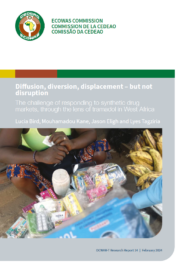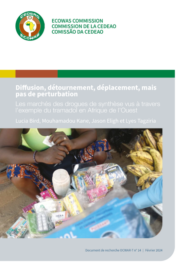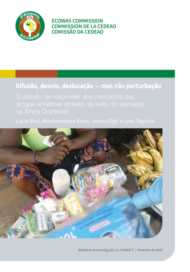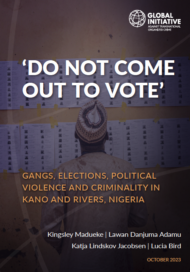Across Africa, the GI-TOC has documented the proliferation of synthetic drugs, the resulting transformation of drugs markets and the escalation of drug-related harm.
The nature of synthetic drug markets – with their low barriers to entry and flexible supply chains – makes them attractive to criminal actors and difficult to respond to. The response in Africa is further hampered by a dearth of evidence regarding the scope and scale of the synthetic drug market. This report explores how synthetic drug markets respond to programming seeking to disrupt them. Tramadol is used as a lens through which to consider existing response frameworks to synthetic drugs in the ECOWAS region and more broadly.
Key findings
- Supply-side responses should target sites close to the point of production of the synthetic drug.
- It is key to harmonise enforcement and regulation of synthetic drugs across different jurisdictions.
- Policy-makers must consider demand, in particular Tramadol’s role as a painkiller, in shaping responses.
- Responses to synthetic drugs in Africa are far behind the curve: the proliferation of substances poses a significant challenge to identification, and interdiction.
- We cannot see what we are not looking for: there is an urgent need for more data on synthetic drug markets in Africa.
À travers l’Afrique, la GI-TOC a mis en évidence la prolifération des drogues de synthèse, la transformation des marchés de la drogue qui en résulte et l’escalade des dommages liés à la drogue.
La nature des marchés de drogues de synthèse – avec leurs faibles barrières à l’entrée et leurs chaînes d’approvisionnement flexibles – les rend attrayants pour les acteurs criminels et difficiles à combattre. La réponse en Afrique est en outre entravée par le manque de données concernant la portée et l’ampleur du marché des drogues de synthèse. Le présent rapport explore la manière dont les marchés criminels réagissent aux politiques et aux programmes visant à les perturber. Le tramadol est utilisé comme grille de lecture pour examiner les cadres de réponse existants aux drogues de synthèse dans la région de la CEDEAO et plus largement.
Recommandations
- Les réponses du côté de l’offre devraient cibler les sites proches du point de production de la drogue de synthèse.
- Il est essentiel d’harmoniser la réglementation et son application aux drogues de synthèse dans les différentes juridictions.
- Les décideurs politiques doivent tenir compte de la demande, en particulier du rôle du tramadol en tant qu’analgésique, dans la formulation des réponses.
- Les réponses aux drogues de synthèse en Afrique sont loin d’être à la hauteur : la prolifération des substances pose un défi important en matière d’identification et d’interdiction.
- On ne saurait voir ce qu’on ne cherche pas : le besoin de données supplémentaires sur les marchés des drogues de synthèse en Afrique est urgent.
Em toda a África, o GI-TOC tem documentado a proliferação de drogas sintéticas, a consequente transformação dos mercados de drogas e a escalada dos danos relacionados com a droga.
A natureza dos mercados de drogas sintéticas — com as suas baixas barreiras à entrada e cadeias de abastecimento flexíveis — torna-os atractivos para os agentes criminosos e difíceis de combater. A resposta em África é ainda mais dificultada pela escassez de dados sobre o âmbito e a escala do mercado das drogas sintéticas. Este relatório explora a forma como os mercados de drogas sintéticas reagem à programação que procura desmantelá-los. O tramadol é utilizado como uma lente através da qual se analisam os actuais quadros de resposta às drogas sintéticas na região da CEDEAO e em termos mais gerais.
Recomendações
- As respostas do lado da oferta devem visar locais próximos do ponto de produção da droga sintética.
- É fundamental harmonizar a aplicação e a regulamentação das drogas sintéticas nas diferentes jurisdições.
- Os decisores políticos devem ter em conta a procura, em particular o papel do tramadol como analgésico, na definição das respostas.
- As respostas às drogas sintéticas em África estão muito atrasadas: a proliferação de substâncias representa um desafio significativo para a identificação e interdição.
- Não podemos ver o que não procuramos: há uma necessidade urgente de mais dados sobre os mercados de drogas sintéticas em África.






